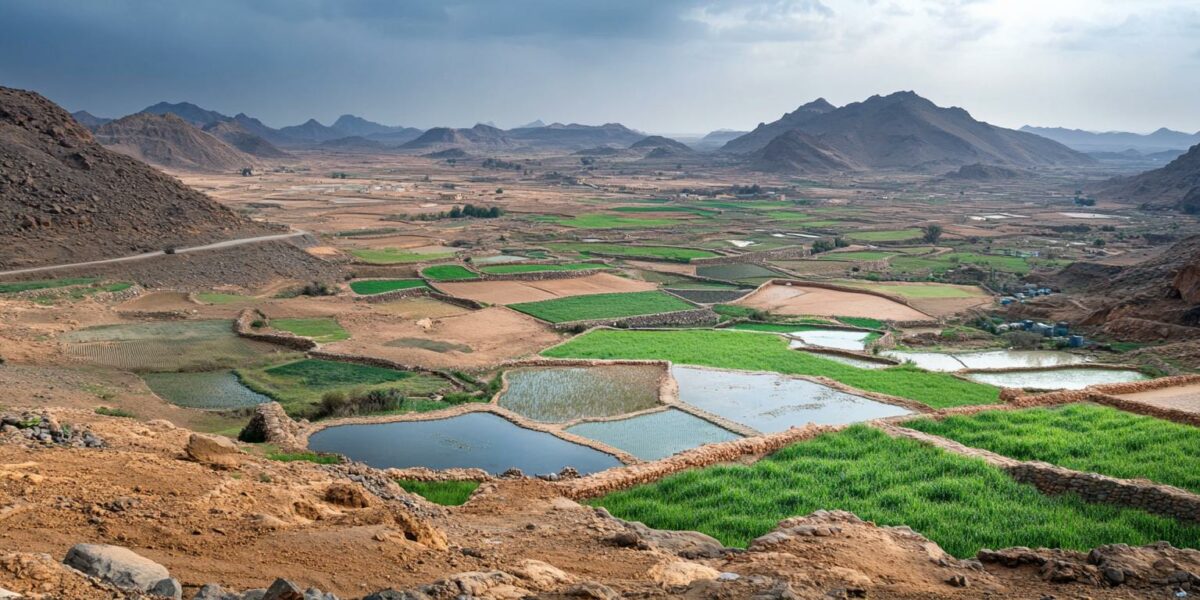Transforming Water Scarcity into Agricultural Prosperity
Yemen’s agriculture has been severely impacted by high fuel prices and prolonged conflict, exacerbating water scarcity. This has left many rural families facing food insecurity. Innovative solutions are required to combat these challenges and ensure sustainable food production.
Water availability is crucial for crop cultivation, livestock breeding, and soil conservation. It supports farmers in expanding arable land, which boosts their ability to feed their families and generate income from surplus produce.
Changing weather patterns and water scarcity hinder agricultural productivity, making it hard for Yemeni farmers to sustain their livelihoods. Floods, torrential rains, and drought-induced desertification further complicate food security efforts.
The UNDP, in partnership with the Social Fund for Development and funded by the World Bank, has implemented the Food Security Response and Resilience Project (FSRRP). This project constructs rainwater harvesting reservoirs, prevents land erosion, and preserves agricultural lands, creating jobs and enhancing water access.
Empowering Farmers through Sustainable Practices
Suleiman, a 42-year-old farmer, now cultivates diverse crops thanks to the FSRRP’s rainwater harvesting tank. “Farmers relied on rainwater and wells, limiting agricultural seasons to certain vegetables,” he explains. The supplementary irrigation reservoirs have significantly improved the situation this year.
These reservoirs have turned barren lands near the reservoirs into fertile grounds, allowing for the cultivation of various crops. The availability of water has transformed the agricultural landscape, providing a sustainable solution to water scarcity.
Key benefits of rainwater harvesting tanks include:
- Increased agricultural productivity
- Improved living conditions for farmers
- Cost savings and reduced effort in preventing harvest failures
The supplementary irrigation reservoirs empower local communities to collect rainwater, addressing water scarcity in Yemen, where rain-fed agriculture is a primary livelihood source.
Land Preservation and Enhanced Productivity
Spillways and irrigation canals have significantly improved rainwater usage, expanded irrigated land, and preserved agricultural land against erosion. Farmers in Abs, Hajjah Governorate, faced substantial losses before these interventions.
The FSRRP Project’s spillways protect agricultural lands from erosion and enhance farmers’ lives. “All farmers have noticed the positive impacts,” says Mohammad, a 35-year-old farmer from Al-Qafrah. “Our lands were prone to erosion, affecting productivity.”
Mohammad used to rent a tractor to repair erosion damage but now benefits from protected land, bringing him joy. “We eat part of what we grow and sell the surplus, helping us buy agricultural supplies and essentials,” he explains.
Greater yields mean more produce to sell, allowing farmers like Mohammad to better support their families amidst rising costs for pesticides, fertilizers, and fuel.
Building Infrastructure and Creating Jobs
Land preservation interventions support Yemen’s agricultural sector, providing vital income sources for farmers. These projects not only enhance productivity but also develop community infrastructure and create job opportunities.
“This project targeted more than 200 households,” states Abdulelah Al-Moayyad, SFD consultant for the spillways project in Al-Wasat, Abs. “The spillways regulate flood irrigation, enhance water retention, and improve soil organic matter levels, boosting productivity.”
Al-Moayyad highlights the project’s “remarkable impact” by allowing farmers to cultivate multiple crops within a single season. Farmers faced land degradation and financial difficulties, but this year has been transformative.
“Rains arrived during the off-season without causing damage, farms were adequately irrigated, and farmers grew crops throughout the year,” recalls Al-Moayyad. The FSRRP Project has significantly improved agricultural resilience and productivity in Yemen.



charlie
Gr8 job World Bank and UNDP! Keep it up! 😄
william
This is fantastic news! Will it be expanded to more areas soon?
Samuel_Oracle
Are the rainwater harvesting systems easy to maintain for the farmers?
Sophie_Catalyst
Is there any way to contribute or donate to this project?
matthewshadow
Glad to see progress in Yemen! What about the other areas still struggling?
Nora_Midnight
How can we support similar efforts in other conflict-affected regions?
NoraSolar2
Great initiative, but how sustainable are these solutions in the long run?
savannah7
Does the project involve local communities in decision-making processes?
madison
Finally, some good news for Yemen! How long did it take to see results?
ChaseFatespeaker
Wow, this sounds amazing! How can other countries replicate such projects? 🌟